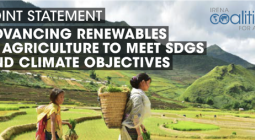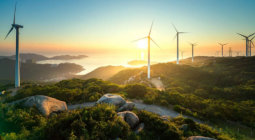Francesco La Camera: "Energy becomes more expensive because the transition is not fast enough"

(Francesco La Camera is the general director of the International Agency for Renewable Energy (Irena). He has been in Barcelona to participate in React Barcelona, the second day for economic reactivation.)
Can the Spanish and Portuguese proposal to put a cap on gas prices slow the energy transition?
— I do not think that a single measure taken by one or more governments can have an impact on a trend in this moment of crisis. What we are seeing now is the perfect crisis of a centralized energy system based on fossil fuels. It is clear to everyone that this system is not reliable, is not economically efficient, has no coherence with the Paris Agreement and generates a number of geopolitical dependencies. We hope this situation will push governments to accelerate the energy transition.
Can the Ukraine crisis lead to more investment in renewables and faster?
— This is what I meant when we talk about reliability and dependency. There is a dependency that will worsen with the Ukraine crisis. The limits of fossil fuels in the energy system were already very evident, but the Ukraine crisis has made this lack of reliability more evident. I think that the measure promoted by the Spanish government has a number of reasons that support it, but there is no doubt that it is leading this acceleration of the energy transition in both Spain and Europe.
France opts for nuclear and could be a cap on renewables being developed here.
— For many years we have said that the first and most important priority is to invest in infrastructures. There really is a patent need for interconnections and flexibility to achieve this balance of the energy system so that renewables can be used everywhere and that their full potential reaches the electricity grid wherever they come from, that everything is interconnected.
What steps must be taken to ensure that renewables provide all the energy for transport and industry, and not just electricity?
— Two days ago we published the World Energy Transitions Outlook in which we stressed that the arrival of renewables to the final sectors must be greatly intensified. Renewables can cover the final energy use much more than we thought a few years ago. In our scenario, electrification and energy efficiency are the two main drivers of the energy transition. In this scenario, renewables will be the dominant energy source, and will be complemented by green hydrogen and sustainable biomass. We believe that in green hydrogen there is great potential to provide electricity to industries and also fuels, such as transport; but it can also be very important for storage. It therefore has a dual role.
Is the rise of the energy we live in, apart from the Ukraine crisis, because the energy transition has a high cost?
It's just the opposite. Prices are becoming more expensive because the path to energy transition is not fast enough. Renewables are the most convenient way to produce energy. And it's not an opinion, it's a fact.
That Europe has ambitious targets for 2030 and 2050 can be an economic disadvantage compared to other parts of the world that do not go at the same pace?
— It is important to understand what the future will be like. Our view is that the faster this race moves towards a clean energy system, the greater the economic and competitive advantage in a global system. There are now 35 other countries, apart from Europe, which have taken a commitment to be neutral on energy-linked emissions by 2050. We can see that there are many other countries that are joining. We can say that the world is moving. There is no doubt that the energy system of the future will be dominated by renewables, complemented by green hydrogen and sustainable biomass. During the last nine years the new installed capacity comes from renewables, not fossil fuels. In the last year, 80% of the new installed capacity came from renewables. If we do a temporary retrospective, the gap gets bigger and bigger. It is unquestionable and unstoppable. The only real problem we have is the speed and scale of the process. The market is pushing us to this new energy system and the reason is that renewables are the most efficient system for generating energy. But this trend is too slow. If we do not substantially modify both the speed and scale of this transition, these 1.8 or 2 degrees Celsius envisaged in the Paris Agreement will fade. What governments should do is link this energy crisis to the Paris Agreements, on the one hand, and to the sustainable development goals on the other.
Should Europe, and especially Spain, Italy and the rest of the Mediterranean countries, invest in renewables on the south shore to break russia's energy dependence?
-There's no doubt about that, yes. But it should be considered that in the new market hydrogen will stand out a lot, and this will lead to less dependency on others. It is important that governments, when creating this new energy system, ensure the diversification of sources.
Author: Xavier Grau del Cerro





